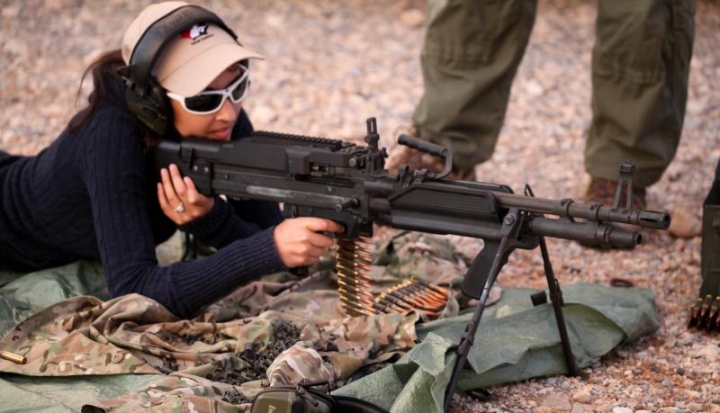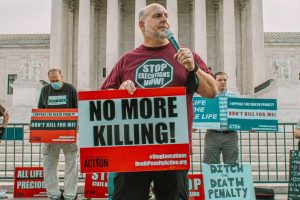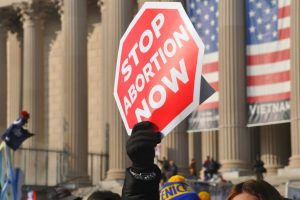My dad died in 2008. He joined the National Rifle Association (NRA) when he came home from Korea and was a member for the rest of his life.
Dear Dad,
I’ve changed my mind about guns. They do need to be regulated, licensed, and limited. I say this especially as a pro-life Catholic.
In America today, guns have become something that they never were for us. We wrangled about whether this or that shotgun gauge was better for ducks or pheasants. Dad, I remember how proud you were when I bested all my Boy Scout friends at an NRA rifle contest. With guns, we felt part of family history; we celebrated rituals like walking Uncle Nick’s cornrows and huddling over steaming coffee in a late November deer stand and passing along Grandpa Joe’s .410 to the next generation. Guns were several things in our home. They were tools for the hunting part of our lives and they were legacies of family traditions. As tools and legacies, they were part of the fabric of our culture and way of life.
I’m sure that for some Americans, guns are still what they were for us—tools and legacies. But, for most that’s not what they are anymore.
For many, guns are no longer a part of the fabric of their way of life; they have become the measure and purpose of their way of life. I wonder if this is related to a decline of religiosity or if it’s a reaction of people who find themselves in an America where everything seems to be eroding or in flux. Remember that kid when I was growing up who became so fixated with fire? Remember how he ended up burning down the high school? I think there are thousands and thousands of people in America who have become crazy about guns like that kid was about fire.
For others, guns are about power, both symbolic and real. If guns are about power over others then they are no longer merely tools. Guys who feel powerless and who worry about not measuring up as a man gravitate toward guns. The bigger and scarier-looking the gun, the better. I blame Hollywood and other parts of America’s culture industry for the prevalence of this fetishizing of guns.
I remember how you laughed at that guy in the duck blind who had painted his shotgun black. Scary-looking guns don’t hunt better, you said. Well, it’s the scariest-looking guns that people are buying these days—a telling sign of how guns in America today are no longer what they were for you. They are now all about having power or feeling powerful. They’re now primarily understood as weapons and increasingly as militarized weapons, designed by manufacturers and at least subliminally valued by their owners for their deadliness against human life.
You know that I’m pro-life, Dad. Over the years, as I’ve become more and more appalled at the unconscionable deaths of innocents, I’ve become pretty strident in my support for pro-life causes. You remember me marching in Washington’s annual January pro-life march. You remember my efforts to advance policies and laws that promote and protect life in all its stages. (And, you would be appalled at what Governor Jerry Brown just approved in California! You used to like him.)
In the last few weeks it’s become clear to me that one cannot be opposed to abortion, euthanasia, and the death penalty and yet remain silent about guns. This year, guns in the United States will kill thousands and thousands of people. I don’t know why it’s taken me so long to see it this way, but clearly this is a pro-life issue. If you are pro-life, then you must be in favor of whatever works to reduce gun deaths. Reflecting the teachings of the church, we are obliged as Catholics, as a matter of faith and morality, to address the availability of guns in public life, just as we are with other life issues. The moral gravity of gun violence is no less than for other life issues.
We know each other too well, Dad, so I know that you’re going to ask me to step down from lofty sermonizing and tell you what this would actually mean in the real world. How do we really achieve such reduction? Well, we could do worse than to take our bearings from the way that the pro-life movement has made progress against abortion: regulation, licensing, limits and, equally importantly, trying to change the culture by promoting supportive policies for families, mothers, and babies.
How would this work for guns? In many states, only state liquor stores can sell liquor. Why not ammunition? In every state, some cars are not allowed on the roads because they are potentially dangerous. In every state, cars need to be licensed, insured, and frequently inspected. Why not guns? One needs to be licensed to scuba dive, run a restaurant, have a dog, operate a ham radio, fish for trout, get married, and oodles of other things. Why not for gun ownership? Such regulations, limits, and licenses are designed to keep the public safe, while allowing mature, qualified, and appropriately healthy individuals to own and use these things safely.
You and I would surely argue about the details. It’s the bigger matter of faith and morals that’s become so compelling to me. This is a moral imperative. Don’t you see? It’s not a putdown or an effort to diminish the way of life that you loved and that I grew up in. Indeed, that way of life would surely flourish if common sense regulations and limits were in place. But if I’m pro-life, Dad, if I’m serious about my Catholic faith, then I must support advancing gun controls in contemporary America.
I know that someday we’ll be tramping through Uncle Nick’s cornrows again. I miss you, Dad.
Steve
Stephen Schneck’s blog, Church and state, will update every Monday. Follow him on Twitter @StephenSchneck.
Image: Flickr cc via Michael Dorausch













